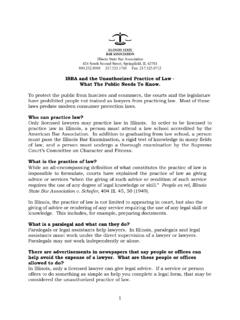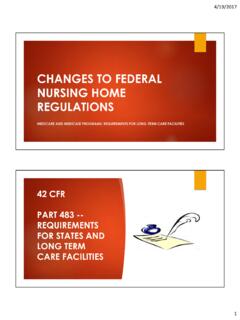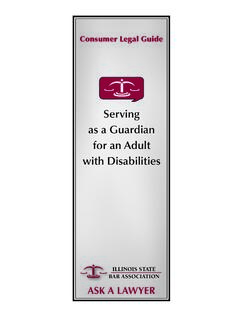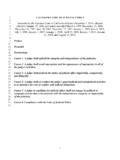Transcription of ISBA Advisory Opinion on Professional Conduct
1 ISBA Advisory Opinion on Professional Conduct ISBA Advisory Opinions on Professional Conduct are prepared as an educational service to members of the ISBA. While the Opinions express the ISBA interpretation of the Illinois Rules of Professional Conduct and other relevant materials in response to a specific hypothesized fact situation, they do not have the weight of law and should not be relied upon as a substitute for individual legal advice. This Opinion was AFFIRMED by the Board of Governors in January 2010. Please see the 2010 Illinois Rule of Professional Conduct (e).
2 This Opinion was affirmed based on its general consistency with the 2010 Rules, although the specific standards referenced in it may be different from the 2010 Rules. Readers are encouraged to review and consider other applicable Rules and Comments, as well as any applicable case law or disciplinary decisions. Opinion No. 93-13 March, 1994 Topic: Employment Agreements - Restrictive Covenants Digest: Employment agreement providing for execution of promissory note by attorney/employee payable only if he/she competes after terminating employment is professionally improper.
3 Ref: Illinois Rules of Professional Conduct , Rules (g) and (j) and Rule (a) Illinois State Bar Association Opinions 91-12, 86-16 and 628 Corti v. Fleisher, 93 517 (1981) Hicklin v. O'Brien, 11 541 (1956) Howard v. Babcock, 18 107, 7 687 (1992) Gray v. Martin, 63 173, 663 1285 (1983) Cohen v. Lord, 551 2d 157 (1989) Hagen v. O'Connell, 68 700, 683 563 (1984) FACTS An employer of attorneys acknowledged that covenants not to compete in the legal field are considered unethical. To try to achieve the same goal, the employer proposes that new employees sign a promis-sory note for a three year period payable only if the employee left his practice and either started his own practice or went to work for another attorney in a four county area.
4 QUESTION Is the above action considered a violation of the Rules of Professional Conduct ? Opinion Rule (a) states: "A lawyer shall not participate in offering or making: (a) a partnership or employment agreement that restricts the rights of a lawyer to practice after termination of a relationship, except an agreement concerning benefits upon retirement." Rule (j) permits payments to a lawyer formerly in a firm pursuant to a separation or retirement agreement as an exception to the requirements of subsection (g) which requires that fees be divided among lawyers in proportion to the services performed and the responsibility assumed by each lawyer.
5 In Opinion No. 628 (1978) applying former rule DR (A) prohibiting restrictive covenants not to compete, a provision in a law firm's employment contract requiring an employed lawyer to pay a percentage of fees from former firm clients on work after termination of employment was determined to be improper. The Illinois Supreme Court deleted former Rule DR (A) of the Code of Professional Responsibility prohibiting restrictive covenants in attorney employment agreements for a number of years prior to the adoption of the current Rules of Professional Conduct in 1990.
6 Restrictive covenants in employment and partnership agreements between lawyers were interpreted under common law cases relating to restrictive covenants. For example, in Opinion No. 86-16, the Committee declined to express any Opinion as to the validity of an employment agreement between a law firm and an associate which provided that the associate would surrender all future business referred to the associate after the employment date by old or new clients of the associate. In Corti v. Fleisher, 93 3d 517 (1981), the Court struck down an agreement as void and against public policy between a lawyer and a firm which essentially required the firm to turn over all firm cases and fees on cases "referred" by the lawyer or by other "reference lawyers" secured by the terminating lawyer/employee without regard to the clients' right to choose their own counsel.
7 However, in Hicklin v. O'Brien, 11 2d 541 (1956), the Court upheld a non-competitive covenant incident to the sale of a law practice which limited the geographical area in which the selling lawyer could practice, stating that "It is not necessary for us to determine whether the contract violates some canon of Professional ethics ." Rule (a) reinstating the prohibition on non-competition agreements is intended to preserve the Professional autonomy of lawyers and the freedom of clients to select a lawyer.
8 Under the facts presented here, the employer proposes to utilize a "conditional" promissory note payable only if the terminating lawyer/employee enters into competition with the employer within a specific geographic area. If the lawyer enters into competition with the former employer, it is intended that the note becomes payable. This arrangement clearly is not a payment to a former firm lawyer pursuant to a separation agreement nor does it relate to benefits upon retirement. If characterized as a portion of future client fees, the employer presumably performed no services or assumed any responsibility for the post-employment cases of former firm clients.
9 Opinion No. 91-12 involved an attorney's contract with a firm requiring him, in case of termination of employment, to surrender all personal notes and copies relating to firm business and, for a three year period, to refrain from calling upon, servicing, or soliciting clients of the firm during his employment. That Opinion concluded that the agreement violated Rule (a) and was void as contrary to public policy to the extent that the agreement deprived clients of the right to be represented by counsel of their choice, citing Corti v.
10 Fleisher, 93 3rd 517, 417 764 (1981). Similar attempts to circumvent the rule have been condemned by courts in other jurisdictions, Howard v. Babcock, 18 107, 7 687 (1992), clause in partnership agreement requiring competing ex-partners to forfeit their share of income from firm's work in progress void as contrary to public policy; Gray v. Martin, 73 173, 663 P. 2d 1285 (1983), partnership agreement that conditioned withdrawing partner's right to certain payments on his not practicing in geographic area held unenforceable as violative of former version of Rule (a) and void as against public policy; Cohen v.



















